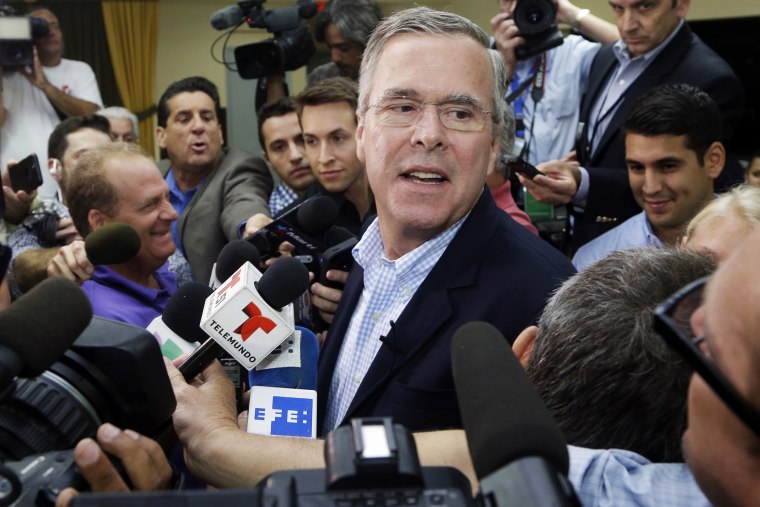Republican presidential hopeful Jeb Bush unveiled his tax-cut plan this week, and when making the pitch to voters, the former governor has said it’s time “to let the big dog eat.” It's a phrase Bush is apparently quite fond of.
He told reporters on Wednesday that "let the big dog eat" is a Florida phrase, though I can report that I'm a Florida native -- and I haven't the foggiest idea what he's talking about.
But the GOP candidate isn't the only one describing the Bush Tax Cuts: The Sequel in confusing ways. Politico ran a headline on Wednesday that read, “Jeb Bush tax plan hits Wall Street.” Soon after, the New York Times' headline told readers, "Jeb Bush Tax Plan Makes Forays Into Populism." Jon Chait noted other news organizations that were similarly generous.
If you have heard about Jeb Bush’s new tax plan by reading political reporters, you have probably heard that it is a “proposal to reform the tax code” that will “crack down on hedge fund managers” (CNN), that it is “mainstream and ordinary” with “a populist note” (NPR), that it “challenged some long-held tenets of conservative tax policy” (the New York Times), and has “a nod to the populist anger roiling both parties” (The Wall Street Journal). It is, in other words, the same sort of coverage George W. Bush received when he unveiled his tax cuts in 1999, and which the campaign successfully cast as a populist departure from traditional Republican priorities.
The problem, of course, is that the coverage paints a distorted view of reality. Matt Yglesias noted yesterday, "The gullibility some in the press are showing about Bush's tax plan would be shocking to someone who hadn't watched the 2000 campaign."
Let's set the record straight.
The massive Bush tax-cut plan is not hostile towards Wall Street and is not an example of populism. It's a multi-trillion-dollar package that disproportionately benefits the very wealthy and which Bush has no idea how to pay for.
MSNBC's Benjy Sarlin explained yesterday that Team Jeb has tried to craft a proposal that "includes something for everyone: new tax breaks for the rich, even bigger ones for corporations, a gentle poke at Wall Street and a variety of new goodies for middle-class and low-income taxpayers. "
That's certainly true. But it's also true that the imbalance is dramatic: the bulk of the benefits are directed to the wealthy and to corporations. As the Wall Street Journal reported, "A new analysis by the business-backed Tax Foundation shows that the biggest percentage increases in after-tax income under Mr. Bush’s tax plan would go to the top 1% of earners, people making more than about $406,000."
The New York Times' Josh Barro added, "On Wednesday, Jeb Bush joined Mr. Trump by issuing a tax plan that ends certain tax breaks for hedge fund managers. But aside from that detail, Mr. Bush’s plan stays very much on script for Republican tax plans: It cuts taxes for almost everyone who pays income tax, with by far the largest tax cuts at the top."
The Bush campaign, well aware of the political realities, wants reports to present the plan in the most palatable way possible, making it seem as if the former governor is breaking with GOP orthodoxy -- and his brother's failed record -- with a less-regressive proposal. Some, evidently, are falling for the misleading pitch.
The facts, however, nevertheless point in a very different direction.
